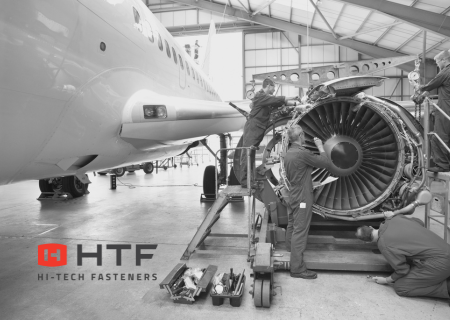Aerospace fasteners play a vital role in securely connecting various components of aircraft bodies. They are essential for the aircraft's performance and its passengers' safety. Neglecting the importance of fasteners can have catastrophic consequences, such as engines detaching or doors opening during flight. Aerospace engineers cannot afford to overlook the significance of fasteners.
The application of fasteners extends across the aerospace industry, encompassing commercial and military aircraft, spacecraft, and missile technologies. Due to the diverse range of aerospace products, fasteners must be specially designed to withstand the demanding and varied environments in which they are used. These fasteners differ significantly from the standard ones we typically encounter.
HTF has experts in aerospace fasteners to help answer your questions and find the fasteners needed for your application. You can trust that HTF has the knowledge, experience, and resources to provide the best service for aerospace industry fasteners. HTF maintains an ISO certification in both the U.S. and Canada.
Types of Aerospace Fasteners
Blind Rivets
Blind rivets, also known as POP® rivets due to their initial production by POP®, are specifically designed for installation in pre-drilled holes. These cylindrical fasteners consist of a mandrel running through the center. They offer exceptional shear and tensile strength, effectively resisting vibration and enhancing joint integrity through substantial expansion on the blind side.
The term "blind rivet" originates from the fact that the "blind end" is installed on the inaccessible side. As the blind end expands, the mandrel snaps off, creating a secure joint on one side of the component. Blind rivets find frequent usage in military, aerospace, and electronic applications due to their unique design and performance characteristics.
Lock Bolt Rivets
Rivet Lock Bolts are a type of two-piece fastener comprising a headed pin with a serrated end and a collar. They are specifically designed to provide a uniform clamp force and excellent resistance to vibrations, making them well-suited for a wide range of applications. These fasteners are commonly employed in trucks, trailers, and various assemblies due to their reliable performance.
Aircraft Nuts
Aircraft nuts can be categorized into two main groups: non-self-locking and self-locking nuts. Non-self-locking nuts require additional external locking devices, such as cotter pins, safety wire, or locknuts, to ensure proper safety. On the other hand, self-locking nuts have an inherent locking feature built into their design.
DZUS® Fastener
Southco DZUS® Quarter-Turn Fasteners satisfy a broad range of requirements for quick access, high strength, and economical performance. Each DZUS® fastener comes with its own matching receptacles for accurate, secure engagement and convenient mounting in various applications.
Self-clinching Fasteners
Self-clinching fasteners are cost-effective for securely fastening thin sheet metal pieces together. These fasteners are installed by pressing them into the sheet material, causing the material to cold flow into the fastener's pilot. This displacement locks the fastener in place, creating a strong and lasting connection between the sheets.
Once installed, self-clinching fasteners become a permanent part of the host metal, capable of withstanding heavy torque loads. They can be installed during or after fabrication and offer several advantages, including durability and the use of fewer hardware components.
Compared to other types of nuts, self-clinching fasteners save space and require fewer assembly operations, resulting in time savings and increased ease of use. They are particularly useful in applications where easy replacement of existing components is necessary or where hardware accessibility is crucial.
Wire Threaded Inserts
Wire-threaded inserts by Heli-Coil® offer a wide range of options, including plating, material, locking, and non-locking variations. This adaptability and reconfigurability make it suitable for various industries such as automotive, industrial, aerospace, and defense. With the increasing emphasis on lightweight materials while maintaining the structural integrity of bolted or fastened joints, Heli-Coil® presents an ideal solution due to its inherent design. It can seamlessly integrate into these assemblies, aligning with the industry trend.
Best Practices When Using Aerospace Fasteners
Aircraft fasteners must withstand high-pressure and high-temperature conditions encountered when operating beyond the Earth's atmosphere. Therefore, their design and construction must prioritize durability and exceptional quality to endure these harsh environments. The production of aerospace and commercial aircraft fasteners relies heavily on the continual advancements in technology within the aerospace industry.
When it comes to best practices in aerospace fastener design, several key factors should be considered. Since aerospace fasteners operate in harsh and demanding environments, they must possess high shear, fatigue, and tensile strength to ensure reliable performance under extreme conditions. Additionally, self-sealing and self-locking capabilities are crucial to maintain secure connections and prevent loosening during operation.
Another important aspect is high corrosion and oxidation resistance to protect against environmental factors that can degrade the fastener's integrity. Lastly, incorporating a lightweight design is essential to optimize fuel efficiency and overall aircraft performance. By adhering to these best practices, aerospace fasteners can deliver the durability, reliability, and efficiency required in the aerospace industry.
HTF Stocks Top Aerospace Brands
These include but are not limited to:
- Boeing Distribution Services, Inc.
- Arconic
- Stanley Engineered Fastening
- B&B Specialties
- Nylok LLC
- Hanson Rivet & Supply Co.
In conclusion, aerospace fasteners are indispensable for ensuring the secure connection of aircraft components, thereby contributing to both performance and passenger safety. Neglecting the importance of these fasteners can have severe consequences, emphasizing the critical role they play in aviation. As the aerospace industry encompasses a wide range of products and environments, specialized fasteners are required to withstand these demanding conditions.
For reliable solutions and expertise in aerospace fasteners, HTF is a trusted provider with the necessary knowledge, experience, and resources to meet industry requirements. Their ISO certification further underscores their commitment to delivering high-quality service in the United States and Canada. Request a quote today, and discover HTF’s superior customer service.









